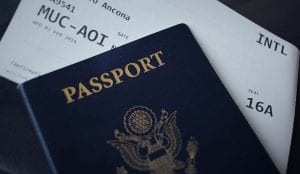
Below, I’ll discuss the five passport myths I’m asked about most often to help you find their reality.
Myth 5 – Passport applications can’t be denied due to financial reasons:
It’s not true. Passport applications can be denied solely on financial grounds. In Canada, under specific circumstances, for example, citizens who owe money to the Crown can have their passport applications denied. In the U.S., a passport application can be denied if you owe the Internal Revenue Service a substantial outstanding balance or if the Department of Health and Human Services certifies you owe too much child support.
Myth 4 – Passports can’t be used for domestic air travel:
Each country’s citizens must check with their own government about what IDs are acceptable for domestic flights. In China, its citizens need their Chinese ID cards for domestic flights, rather than passports. U.S. citizens can use their passports for domestic air travel.
Myth 3 – Passport photos may be in black and white or color:
Some countries such as Canada permit their citizens to submit passport photos in black and white or color, at this time. In the U.S., France and the United Kingdom, for example, passport photos must be in color. Check your country’s passport rules before renewing or applying for a passport.
Myth 2 – An unexpired passport is good for international travel everywhere:
This isn’t true. For example, most Schengen area countries require passports to be valid for at least three months beyond one’s date of departure. More than 50 countries, including Venezuela, Ecuador, China and France require passports be valid for at least six months after one’s arrival. Thinking about visiting Istanbul? In Turkey, passports must be valid for at least 60 days after visitors’ six- month visas expire. That’s eight months after visitors enter Turkey. I renew my passport about a year before it’s due to expire to ensure I can use it anywhere.
Myth 1 – U.S. citizens don’t need a passport on some cruises:
This is true, but the realities of international travel make it moot.
U.S. travelers can take a “closed loop cruise” as defined by U.S. Customs and Border Protection. It’s a cruise that goes to at least one foreign port that begins and ends in the same U.S. port. Many cruises to the Bahamas, Bermuda and the Caribbean are “closed loop.” U.S. citizens need only a birth certificate and a government issued photo ID to leave and reenter the U.S. on these cruises.
I think if we asked Michelle Manuel and Rose Johnson today, they’d tell you to always bring a passport on any cruise. Last month, the duo were on a “closed loop cruise” to the Bahamas. Ms. Johnson became extremely ill on the ship and was taken to a hospital in Nassau. She had a serious condition. She needed to fly home for surgery. Neither Ms. Manuel or Ms. Johnson had a passport.
You can’t fly on an international flight without a valid passport.
Travelers can get a new or replacement passport, while in a foreign nation, at a U.S. embassy or consulate that has passport services. Fortunately for the pair, there is a U.S. Embassy in Nassau. It took some time, but they were able to obtain U.S. passports and eventually fly home to Kentucky.
The costs to obtain a passport in a foreign country can be substantial and you won’t necessarily get it overnight. It may be a trek to get to the embassy. You’ll have transportation, meal and lodging costs along with the cost of the passport itself.
Read also: Cruise passengers should have passports — period
Medical emergencies on trips which require a return home are documented regularly. Family and business emergencies occur requiring travelers to quickly return home. If you have an emergency while in a foreign country, you need a passport to fly home.
Sometimes, cruisers are late on the day of their embarkation and have to fly to the first port of call to catch up to their ship. If it’s an international port, they need a passport to fly there. Sometimes, cruisers don’t get back to the pier on time and find their ship has sailed. If the port is in a foreign country they’ll need a passport to fly to the next port or home. Without a passport, they’ll be denied boarding.
So, while travelers might not legally need a passport on some cruises, commonsense screams that cruisers should always have their passport on any international cruise, even “closed loop cruises.”
Misinformation and misunderstandings about passport rules and regulations have too often fouled up too many travelers’ international trips before they’ve started or ruined their international journeys long before they were set to end. Don’t let that be you.
(Featured Photo by Nicole Harrington on Unsplash.)
After many years working in corporate America as a chemical engineer, executive and eventually CFO of a multinational manufacturer, Ned founded a tech consulting company and later restarted NSL Photography, his photography business. Before entering the corporate world, Ned worked as a Public Health Engineer for the Philadelphia Department of Public Health. As a well known corporate, travel and wildlife photographer, Ned travels the world writing about travel and photography, as well as running photography workshops, seminars and photowalks. Visit Ned’s Photography Blog and Galleries.



